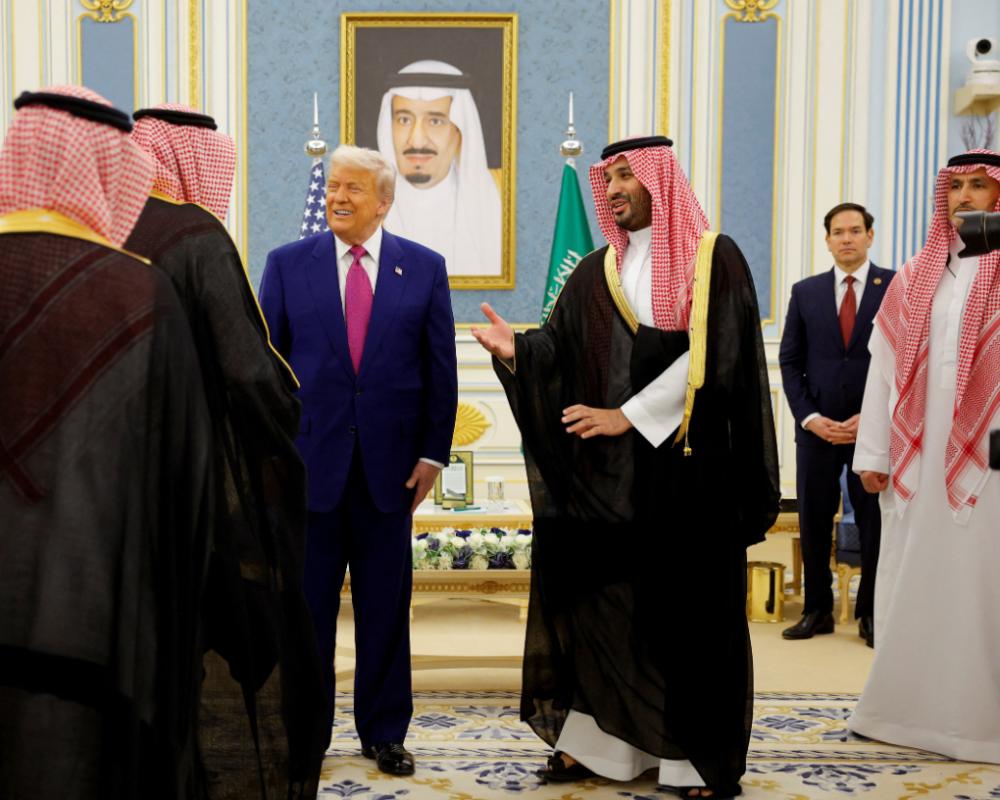
Beit Sahour, West Bank /PNN /
A new public opinion poll released Tuesday shows that a majority of Palestinians view U.S. President Donald Trump’s recent visit to Saudi Arabia negatively, amid ongoing Israeli military operations in the Gaza Strip.
According to the poll conducted by the Palestinian Center for Public Opinion (PCPO), headed by pollster Nabil Kukali, 70.6% of respondents rated Trump’s visit as negative. Only 5% viewed it as “very positive,” while 17.9% said it was “somewhat positive.” Another 6.5% had no clear opinion.
The visit, which came after Trump launched his re-election campaign, has sparked widespread criticism among Palestinians, many of whom believe the timing ignores the devastating war in Gaza and instead prioritises economic and regional alliances.
Kukali said the findings reflect “growing frustration and mistrust” towards recent American and Arab diplomatic efforts, particularly when they are not accompanied by tangible steps to end the Israeli occupation or support Palestinian rights.
According to the survey, 58.2% of respondents said the visit’s main objective was to sign major economic deals. Another 17.2% believed it aimed to push forward normalisation between Saudi Arabia and Israel. Only 11.2% thought strengthening political ties was the key motivation, while others cited various other reasons or were not interested.
When asked about the impact of the visit on Saudi Arabia’s global image, 51.5% of Palestinians said it portrays the kingdom as being subordinate to the U.S., while 22.6% said it had no significant impact. Just 19.7% said it enhances Saudi Arabia’s status as a regional leader.
Regarding the visit’s impact on the Palestinian cause, 43.5% said it would have no effect, 31.3% believed it would be negative, and only 21.1% thought it might be positive.
Amid the continued war in Gaza, 58.5% of respondents said they believe Saudi Arabia will not play an effective role during Trump’s visit. About 21.6% expressed hope that Riyadh would pressure Washington to end the fighting and lift the siege on Gaza, while 15.9% expected humanitarian assistance and border facilitation.
Despite widespread public calls for a stronger Saudi stance, 41% of respondents said they do not trust the kingdom to demand an end to the war during Trump’s stay. Another 25.6% said they have “moderate” trust in such a move, and only 12.4% expressed strong confidence.
As for the likelihood of the U.S. responding to any Saudi demand for a ceasefire, 39.6% expressed “relative optimism,” 36.3% believed Washington would not respond, and 19.4% said the U.S. would definitely act.
When asked about Trump’s primary motivation for the visit, 57.5% cited economic interests, 20.1% said it was to support Israel, and just 7.5% said it was to resolve the Palestinian-Israeli conflict.
Regarding normalisation with Israel, 39.1% said it should be conditioned on achieving a just solution to the Palestinian issue, while 50.5% opposed linking normalisation to political resolutions.
The survey was conducted in the third week of May 2025 and included a random sample of 402 Palestinians from the West Bank (including East Jerusalem) and the Gaza Strip, aged 18 and over. It was carried out through computer-assisted telephone interviews (CATI), with a margin of error of ±4.9% at a 95% confidence level.
The findings reflect widespread scepticism and dissatisfaction with the current political climate, particularly regarding the roles of the United States and Saudi Arabia in resolving the Palestinian-Israeli conflict.
“The Palestinian public doesn’t see Trump’s visit as a constructive step,” Kukali said. “The prevailing sentiment is one of deep scepticism towards any move that does not genuinely address justice and Palestinian rights.”